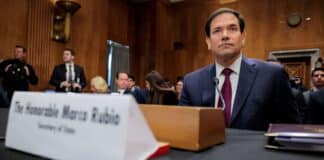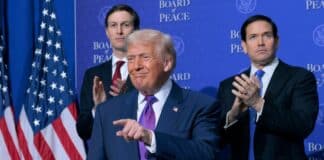“The moderation and virtue of a single character probably prevented this Revolution from being closed, as most others have been, by a subversion of the liberty it was intended to establish.”
– Thomas Jefferson, speaking of George Washington
From America’s founding to modern times, true leaders have stood apart not merely for their vision but for their rare capacity to connect long-term ideals with decisive short-term actions. Few figures embody this blend of visionary thinking and practical execution as powerfully as George Washington and, in our era, President Donald Trump.
George Washington: Visionary Leadership in Action
George Washington’s reputation as the Father of Our Country is not simply a tribute to his victories in battle but to his profound ability to hold a grand vision for America while guiding the fledgling nation through immediate crises. His leadership shines brightly when viewed through two crucial lenses: visionary foresight and the discipline to align daily decisions with that vision.
Vision for a Republic
Washington was elected Commander in Chief of the Continental Army on June 15, 1775. The Congress chose him for his character, military experience, and his capacity to unite diverse colonies under a single cause. But his genius lay deeper still—in the clarity of his vision. Washington’s goals were threefold:
- Win the war for independence, no matter how long it took.
- Secure liberty and freedom from Great Britain.
- Establish a constitutional republic where government power would derive from the people.
These were not mere slogans but guiding principles influencing every military order, political negotiation, and public address he gave. His long-range vision extended beyond American shores. Washington foresaw America as an example to the world—a beacon whose republican ideals would inspire generations globally.
Balancing Vision with Immediate Realities
Yet Washington’s true genius was his capacity to link grand ideals to practical action.
Consider the winter of 1776. After the daring Christmas crossing of the Delaware and the victory at Trenton, Washington faced mass desertion as soldiers’ enlistments expired. In that pivotal moment, he personally appealed to his troops, urging them to stay and continue the fight. His presence and heartfelt words turned wavering soldiers into committed patriots. That singular act preserved the Continental Army and, arguably, the entire revolutionary cause.
Likewise, at the Battle of Monmouth in 1778, Washington turned retreat into rally. His leadership halted chaos and transformed a near-defeat into a stand that forced the British to withdraw.
Even after the military victory, Washington continued to guard his republican ideals. In March 1783, at Newburgh, New York, some officers, frustrated by unpaid wages and lack of recognition, plotted to pressure Congress. Washington entered their meeting, delivered a humble yet powerful address, and quenched the seeds of mutiny. He knew that a republic could not be born from military tyranny. His voluntary resignation as Commander-in-Chief in Annapolis later that year symbolized the supremacy of civilian rule—a principle foundational to American liberty.
Washington’s genius lay in understanding that short-term expedients must never violate long-term principles. Ethics mattered even in war. Soldiers foraging for supplies were ordered to respect civilian property, preserving public goodwill crucial for future nation-building.
President Trump: Vision and Discipline in Modern Leadership
Fast-forward two and a half centuries. President Donald J. Trump has emerged as one of the most polarizing yet impactful leaders in modern American history. Like Washington, he combines bold vision with a relentless focus on translating ideas into practical results—even in the face of intense criticism.
Vision for Peace in the Middle East
Consider his posture toward Iran. President Trump repeatedly stated his desire to see a “great future” for the Iranian people. He was not content merely to contain Iran’s nuclear ambitions or manage regional instability. He sought to transform the Middle East by fundamentally
- Promoting the Abraham Accords, which established diplomatic ties between Israel and several Arab nations, breaking decades of entrenched hostilities.
- Signaling openness to Iran’s prosperity under a non-nuclear, peaceful regime—a sentiment captured in his memorable phrase, “Make Iran Great Again.”
Trump’s vision echoes Washington’s: a belief that freedom and prosperity are not limited to America but should extend globally as a force for good.
Discipline Amid Crisis
Where Trump’s leadership particularly mirrored Washington’s was in his ability to maintain discipline and strategic secrecy while preparing for action.
During a tense 60-day standoff over Iran’s nuclear program, President Trump demonstrated remarkable patience. He gave the Iranian regime every opportunity to negotiate. Publicly, he signaled openness to talks, even extending a two-week grace period—an artful psychological maneuver that lulled adversaries into misreading his intentions.
Meanwhile, behind the scenes, Trump orchestrated complex military preparations for precision strikes should Iran refuse to comply. Critics who mocked his restraint as weakness were left stunned when, following failed diplomacy, a meticulous operation unfolded. The strikes were executed with surgical precision, reflecting not impulsive aggression but carefully planned deterrence.
Courage in Command
Leadership often demands ignoring both critics and supporters. Washington faced doubters within the Continental Congress, just as Trump battled fierce opposition from the media, political rivals, and sometimes even his party.
President Trump’s capacity to stay focused despite relentless personal and political attacks exemplifies a crucial leadership trait Jefferson once recognized in Washington: the “moderation and virtue of a single character.”
Whether deciding to move the U.S. embassy to Jerusalem, negotiate historic peace accords, or order strikes to eliminate terror threats, President Trump displayed the lonely courage that leadership demands. He neither shrank from critics nor allowed supporters to push him into reckless escalation.
A Modern Team Builder
While Trump’s flamboyant persona dominates headlines, it obscures another truth: he is a highly skilled organizer and manager. Running a business empire that includes hotels, resorts, golf courses, and global enterprises has honed his ability to lead large, complex systems.
This operational competence is reflected in Trump’s presidency. The Iranian strike, for example, required seamless cooperation across intelligence agencies, military commands, and diplomatic channels. The scale and secrecy of the mission demonstrated a President who, like Washington, could both envision a distant objective and marshal the immediate actions necessary to achieve it.
Lessons for Our Time
Washington and Trump come from vastly different centuries, cultures, and personal styles. Yet both stand out for uniting grand visions with decisive, coherent action.
- Vision matters. Nations—and movements—die without it.
- Character counts. Personal integrity builds trust and inspires followers.
- Action must serve principle. Short-term wins that violate long-term ideals ultimately sabotage leadership.
- True leaders accept isolation. Great decisions are often made alone, under fire from every side.
In an age craving both bold vision and steady execution, America would do well to remember the examples of George Washington and President Trump. It is through such leaders that a nation preserves liberty, secures peace, and shapes a brighter future.





